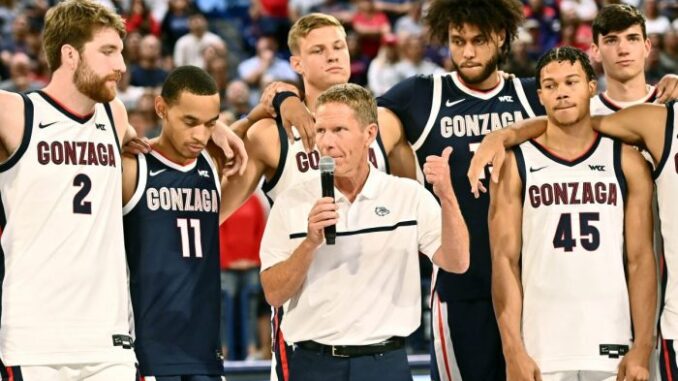
Mark Few “You Know What Needs to Be Done” I’ll employ the same strategy, tactics, and techniques as I did during the Olympics in Paris.
In 2021, I had an urgent message for Slate readers ahead of the NCAA men’s basketball tournament: The Gonzaga Bulldogs were on the verge of becoming the best team ever. It did not work out, as Gonzaga fell to Baylor in the national championship game. In 2022, I was undeterred. “Just pick Gonzaga,” I urged. “Their time has come. And if it has not, I will rewrite this argument every March until it does.” Once again their time did not come. Gonzaga lost even earlier, in the Sweet 16. In 2023, I stayed strong. The headline read, “Just Pick Gonzaga Again. No, Really!” The Bulldogs were peaking at the right time and seemed as good a bet as anybody, but they fell to eventual champion Connecticut in the Elite Eight.
In 2024, it would be easy to drop the obsession. Gonzaga didn’t win the title with its best team ever in 2021, and the past few years, it has fallen earlier in March Madness. And unlike each of those recent Gonzaga outfits, the 2024 team did not even win the West Coast Conference that the program customarily dominates. Glory appears farther away than ever for a team that has made the NCAA Tournament 25 years in a row while shifting from mid-major underdog to big-time juggernaut to sad disappointment.
But no. As is so often the case in men’s hoops, the 2024 tournament does not have a dominant team that looks poised to choke the life out of the competition. The 68-team bracket is wide open, and Gonzaga, as the No. 5 seed in the Midwest region, has a legitimate chance to break through the noise. It’s again time to drill into a piece of ground that has yet to yield oil but eventually should: In 2024, pick Gonzaga open, and Gonzaga, as the No. 5 seed in the Midwest region, has a legitimate chance to break through the noise. It’s again time to drill into a piece of ground that has yet to yield oil but eventually should: In 2024, pick Gonzaga
Before picking Gonzaga, you will need to eliminate the other 67 teams one by one. Fortunately, finding a fatal flaw in a college basketball team is as easy as finding one in a Tinder match. Most men’s college seasons do not feature one dominant team that towers over the rest through the regular season and conference tournaments. The last was arguably 2021 Gonzaga. True to the sport’s form, the No. 1 seeds in the 2024 bracket are all easy enough to dismiss if you have an agenda to push.
UConn, the reigning national champion, is the number one seed overall. The Huskies are fantastic, but historically, they have won championships as somewhat of a Cinderella team, or at least from the outside, rather than as the top dogs. (They were a No. 7 seed in 2015 and a No. 4 last year when they won it all.) They should win the tournament because of their explosive offense, but their East region is more tougher than UConn’s merit as the top seed. Perhaps more importantly, UConn has had to play a lot more games than usual over the previous two seasons since it is difficult to repeat. Since Florida in 2007, a very long time ago, no team has won again. Let’s ignore Dan Hurley’s squad despite the fact that they have by far the simplest on-paper case to win the thing again.
The other No. 1s have real issues, though. Houston plays with voracious intensity at all times under coach Kelvin Sampson, but they just got run out of the building by Iowa State in the Big 12 championship game, not unlike the time Sampson’s team met unholy destruction against Baylor in 2021’s Final Four. When guard Jamal Shead has a down offensive night, the Cougars are vulnerable. North Carolina is somewhat the reverse; when star guard RJ Davis had ineffective scoring games against Duke, his teammates picked him up and the Tar Heels swept the Blue Devils anyway. But UNC is relatively undersized and also leans heavily on a freshman point guard, Elliott Cadeau. He’s good. He’s also a freshman, and it’s March.
The most captivating team might be Purdue, the other No. 1 seed. The Boilermakers hope to mount a vengeance tour after taking literally the worst loss in the history of college basketball in last year’s tournament. The good news: Matt Painter addressed his team’s fatal shortcoming in that loss to 16th-seed Fairleigh Dickinson. The tiny FDU players simply swarmed all over 7-foot-4 center Zach Edey, the best player in the country, and made Purdue’s other guys hit shots from some distance. They couldn’t, and FDU got some epic luck and pulled the upset. Last year’s Purdue team was very bad at 3-point shooting, but this year’s is amazing at it. They make 41 percent of their triples, second-best in Division I, and move the ball around in a beautiful symphony. They could still lose, though. After all, Painter’s teams always have.
The No. 2 seeds are a mishmash themselves—all very good, all with a few kinks. Iowa State is the best defensive team in the country, but they struggle mightily to get the ball through the hoop. Arizona is a well-rounded team, but they lost two of their three games going into the tournament. Tennessee has lost two straight games going into the tournament, and Rick Barnes, the coach of the Volunteers, is perhaps the quintessential March underachievement—something has to give between Vols guard Dalton Knecht’s amazing basketball skills and Barnes’ historical ability to lose before the regional weekend. Marquette went 0–3 against UConn and was hardly competitive, which might say something about the Golden Eagles’ chances of surviving in the later rounds.

Leave a Reply